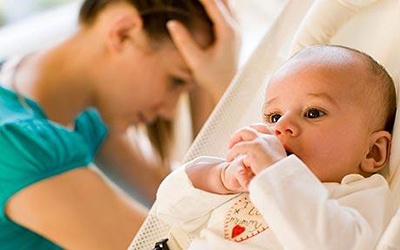 Introduction
Introduction
Psychiatric/Psychological issues after giving birth is not only confined (pun intended) to ‘meroyan’. If we take a peek into Dewan Bahasa Pustaka dictionary, ‘meroyan’ is defined as “emotional instability after giving birth due to hormonal changes, causing the mother to be depressed or to act aggressively etc”. In the discipline of psychiatry, this definition is close to what is said to be post-partum depression (depression after giving birth) and post-partum psychosis (a serious mental disorder after giving birth). Other that those two, there is also postpartum blues, I,e: an emotional stress after giving birth.
Postpartum blues rarely gets any attention because it is not serious and does not involve the mother acting violent outside the boundaries of sanity. Postpartum blues is natural: 50-80% of mothers who recently deliver, especially first time mothers experience these short term symptoms. Ongoing postpartum blues added with other risk factors can trigger postpartum depression and postpartum psychosis, with percentage of occurrence being 10-15% and <1% respectively.
Risk factors
Is there a “meroyan demon” that resides in the placenta, causing the postpartum depression and postpartum psychosis to happen? At least that is what a segment of the society believes in. Unfortunately, this is unproven scientifically and also not in authentic Islamic tradition.
Hormonal instability is the common cause in many scientific writings (Pearlstein 2009). All pregnant mothers and the ones who have delivered experience hormonal changes in their bodies. Most of them are not affected by this ‘madness’. Other factors should be kept in mind, whether a person has had past psychiatric problems, a history of depression during pregnancy (antenatal depression), an unstable social support structure or experienced a traumatic event during pregnancy i.e: loss of a loved one or divorce. Apart from that, living alone or the perception of living alone and having a close relative with psychiatric issues have also been reported as potential factors.
Signs
Among the earlier signs of postpartum depression is crying for no reason,, overly sensitive, being impatient, excessive worrying, lethargy, lack of sleep or insomnia (or maybe hypersomnia, too much sleep), perpetual sadness and no motivation to care for the newborn. If kept unchecked, things will get serious and more signs will appear such as feeling of uselessness, suicidal thoughts, excessive suspicion and obsessive thoughts.
Postpartum psychosis can occur following postpartum depression or spontaneously appear in the 4th to 6th week after delivery. Individuals affected by it will start acting weird, hallucinate, talking incoherently, have delusions and impulsive actions. Postpartum psychosis is an extreme psychiatric issue and patients are at high risk to commit suicide and kill their babies as compared to other phenomena.
Prevention
Please refer to the mmgazette.com article “Tempoh Berpantang: Mimpi Ngeri Selepas Bersalin?”https://www.mmgazette.com/tempoh-berpantang-mimpi-ngeri-selepas-bersalin-dr-ayu-akida/ and “The Benefits of Breastfeeding” https://www.mmgazette.com/the-benefits-of-breastfeeding-mohd-fauzee-bin-mohd-zaki/, these articles stress on the importance of a good diet and nutrition and breastfeeding to balance the emotional condition of the mother. Mothers should be aware that certain vegetables and fruits are proven to help reduce the risks of postpartum depression (Chatzi 2011). Do utilize channels to express emotions such as talking to loved ones, family members, a good friend or keep a diary and do not stay in isolation. Periodic education in antenatal checkups during pregnancy is also important because it helps in preparing a good mental and physical condition.
Do remember to also harmonize the spiritual aspect. Among Muslim ladies, there is a misconception that it is prohibited to recite the Quran during the period of being ‘unclean’. The majority of scholars agree that this issue is debatable. A strong opinion states that reciting of the Quran (while not touching it) is permissible (www.islamqa.com). Postpartum mothers should seek refuge using zikr from the verses of the Holy Quran and supplicate to Allah. During this time of difficulty (including during pregnancy, delivery and matters following them), Muslims have the chance to be close to the Almighty (Quran 16:62).
Treatment
It is a norm among psychiatrists to encounter cases where the public thinks psychiatry is ‘not real science’. “Why should I see a psychiatrist, I am not crazy”, is a familiar quote marking this misconception. Thus when mothers who recently gave birth and show early signs of depression and emotional instability, the psychiatrists are the ones who should be on top of their list to be seen, at least for an evaluation. This is the stigma in our society. If this barrier is not removed, the treatment cannot follow through.
Postpartum psychosis and postpartum depression can be treated using safe medications and techniques under tight surveillance of a doctor. Issues of medications and nursing mothers are dealt based on individual cases. There are also cases that needed observations in hospitals. In whichever case, the health of the mother and baby is always top priority.
Seeing a psychiatrist doesn’t mean that you are crazy, or you have a weak spirit or weak faith. Not necessarily all the cases seen by psychiatrists are ‘meroyan’. The point is, if you are in doubt about your relatives who recently gave birth showing symptoms; please bring them directly for an assessment. And Allah knows best.
Dr Zul Azlin Razali is a Psychiatrist in Universiti Sains Islam Malaysia (USIM). This article was translated by Azizul Ismie Mohd Puad from https://www.mmgazette.com/gila-meroyan-dr-zul-azlin/
References:
- Chatzi, L., et al. Dietary patterns during pregnancy and the risk of postpartum depression: the mother-child ‘Rhea’cohort in Crete, Greece. Public health nutrition. 2011; 14(9):1663-1670.
- Henshaw, C. Mood disturbance in the early puerperium: A review. Arch Womens Ment Health. 2003; 6:S33-S42.
- Pearlstein, T., Howard, M., & Zlotnick, C. Postpartum depression. American Journal of Obstetrics & Gynaecology. 2009; 200(4): 357-364.
https://islamqa.info/en/2564
[This article belongs to The Malaysian Medical Gazette. Any republication (online or offline) without written permission from The Malaysian Medical Gazette is prohibited.]
